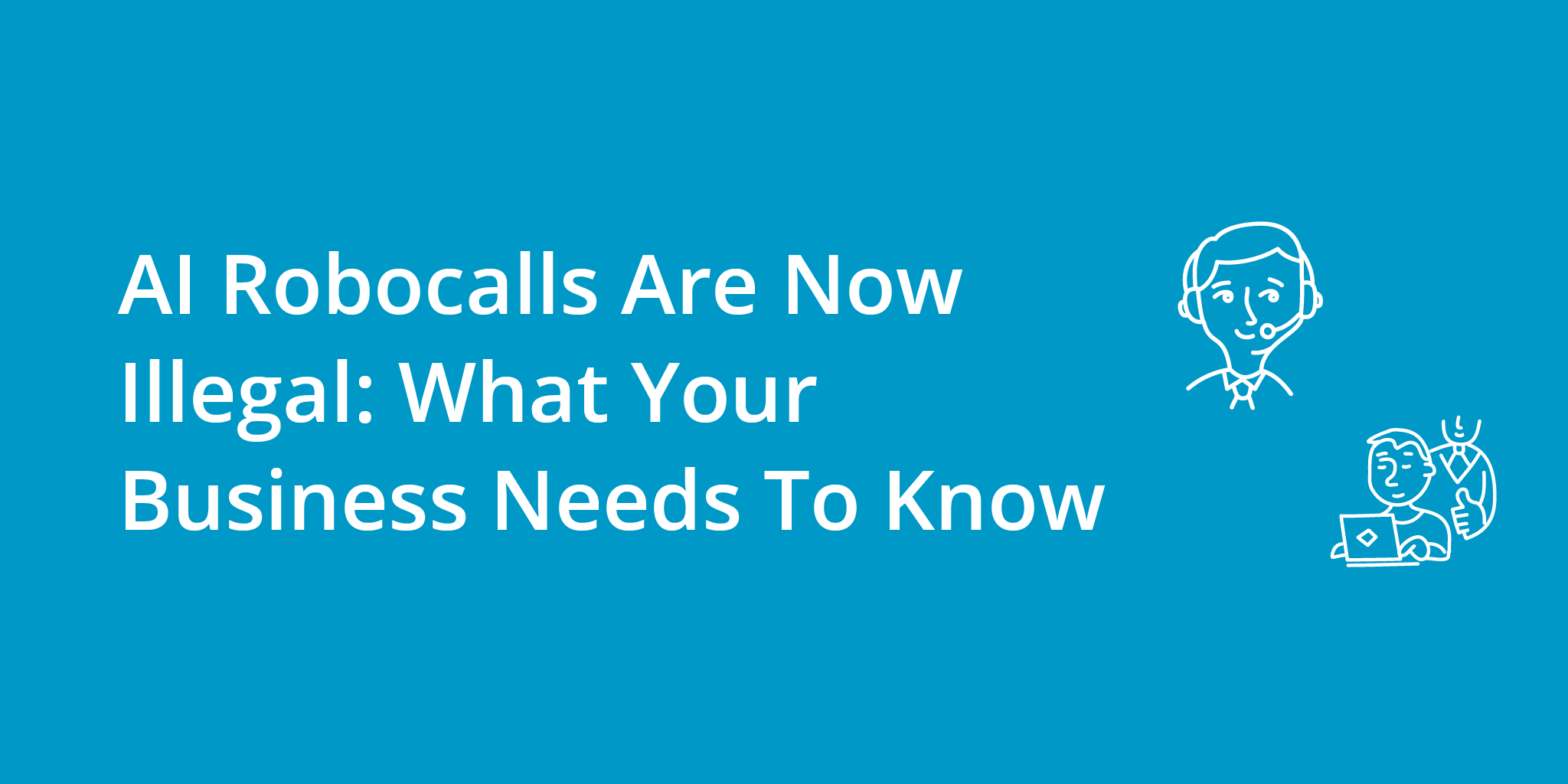Not a week goes by that I don’t receive an unsolicited political text message. And I’m not alone. Many folks across the US have been getting unwanted calls and texts from political organizations. So much so that it’s caught the FCC’s attention.
It turns out I’m one of the lucky ones who isn’t receiving (deceptively realistic) AI robocalls about politics. This is what much of the FCC regulation’s focus has been on recently: AI-powered robocalls that sound so real they’re misleading voters.
While political messages are technically exempt from the Do Not Call List requirements, the TCPA still regulates cold texts and phone calls that go out to the public on behalf of political organizations. The FCC’s ruling in early February that makes AI robocalls illegal under the TCPA reinforces that sending misleading and confusing messages to voters won’t be tolerated.
Now that AI robocalling is illegal, what does this mean for your business? Let’s take a look at the details.
Understanding AI Robocalls
AI robocalls are automated telephone calls that use artificial intelligence and machine learning algorithms to simulate human conversation. Unlike their traditional counterparts, AI robocalls can understand voice responses from recipients and adapt their dialogue in real time, leading to a more engaging and less obviously automated experience.
These calls can be used for various purposes, including marketing, customer service, and even scamming, by mimicking human behaviors and responses more closely than ever before.
There are even AI software applications capable of successfully holding a sales conversation and booking a meeting over the phone. These technological advancements have made AI robocalls more sophisticated and also more challenging to regulate.

Which Laws Govern AI Robocalls?
The legal landscape surrounding AI robocalls is complex. It varies by jurisdiction, with numerous laws designed to protect consumers from unsolicited calls while balancing the interests of legitimate businesses. A key piece of legislation in the United States that addresses robocalls, including those made by AI, is the Telephone Consumer Protection Act (TCPA).
Telephone Consumer Protection Act (TCPA)
- Enacted in 1991, the TCPA was designed to restrict telemarketing calls and the use of automated telephone equipment.
- Consent Requirement: The TCPA requires businesses to obtain prior express written consent from consumers before making robocalls or sending automated texts.
- Do Not Call Registry: The Act also supports the National Do Not Call Registry, allowing individuals to indicate they do not wish to receive telemarketing calls.
- Penalties: Violations of the TCPA can result in significant fines, with large penalties per violation for knowingly or willfully breaking the law.
The FCC recently amended the TCPA to prohibit AI robocalls – meaning calls that are automatically dialed without human interaction and use AI-generated voice. These types of calls can be especially deceiving and have been used to mislead people intentionally. For example, AI robocalls using a voice that sounded like President Biden were used before the New Hampshire primary election in January 2024 to discourage people from voting.
The Impact of AI Robocalls on Businesses and Consumers
The impact of AI robocalls on consumer trust and business reputation is a significant concern for companies leveraging this technology for communication.
While AI robocalls can offer efficiency and personalization in outreach efforts, their effects on recipients can range from mildly irritating to deeply invasive, potentially leading to negative perceptions of the businesses behind them.
Balancing Efficiency and Respect for Consumers
- Transparent Communication: Businesses can mitigate negative impacts by being transparent about their use of AI for calls, ensuring consumers are aware of and consent to the technology’s use.
- Personalization and Relevance: Leveraging AI to personalize calls and ensure their relevance to the recipient can improve the perception of these communications, making them feel more valuable and less intrusive.
- Ethical Use and Compliance: Adhering to legal requirements and ethical standards in the use of AI robocalls is crucial. Businesses should prioritize consumer privacy and consent, using these technologies in ways that respect consumer preferences and boundaries.

Alternatives to AI Robocalls
There’s no doubt that using AI in your business operations can make manual processes faster and help scale your growth. However, it’s important to balance efficiency with respect and care for your customers. While AI robocalling might make sense in some contexts, there are other alternative tools you can use to avoid legal and ethical grey areas and still stay in touch with your clients.
- Multi-line power dialer: This kind of sales dialer is sometimes called a parallel dialer, and it does exactly that – it dials many numbers in simultaneously. Unlike an AI robodialer, a person needs to initiate the dialing session and be available to speak to a person who answers the call. With a multi-line power dialer, outbound sales teams can make more calls per day and reach a much higher number of potential customers.
- Local presence dialing: Local presence dialing software uses technology to call out with a phone number that is local to the person you are calling. Essentially, the phone number that is used to dial out will match the area code of your prospect. Local presence dialing can significantly increase your connection rate, especially when paired with a multi-line dialer.
- Speed to lead software: Speed to lead is the time it takes a business to respond to an inbound inquiry. Successful businesses respond quickly, if not immediately, to people asking for information about their products or services. You can setup sales automation that will instantly follow up with new leads.
- Outbound call and text automations: Calling and texting cadences help you stay on top of reaching out to potential customers and current clients. You can setup automatic outreach cadences so that you never forget to call or text an interested customer. These cadences can also save you time and free up hours for you to focus on other high-value tasks.
Looking Ahead: The Future of AI in Business Communication
As AI continues to evolve, we will likely see more regulations to protect consumers and limit the unethical use of AI technology. In the meantime, it’s best for businesses to air on the side of caution and imagine themselves in the shoes of a consumer. In other words, would you find this kind of communication annoying, misleading, or obtrusive? If the answer is yes, there’s a better way to do it.



